
The Mission Diocese held its 3-day summer festival on the premises of the Loimaa Evangelical College. This culminated in the solemn consecration of the new Bishop on Sunday 1 August 2021. Bishop Risto Soramies with assisting pastors and bishops consecrated the Rev. Dr. Juhana Pohjola (49) to serve as the new bishop of the Mission Diocese. The huge main tent and the surrounding smaller ones, as there were health and safety measures to be taken into consideration, held over 800 guests. The festive mass itself was celebrated in fine weather despite a very menacing weather forecast.
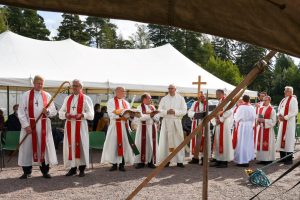
The procession of the Cross preparing for the mass to begin. The bishop’s crosier is carried by the Rev. Kalle Väätäinen, the pectoral cross by the Rev. Dr. Petri Hiltunen, the chasuble by the Rev. Miika Nieminen, and the mitre by the Rev. Ville Typpö, all of them regional provosts.
The brass ensemble, the choir and the singing congregation received the lengthy Procession of the Cross, in which the regional provosts before the bishop elect carried the symbols of the bishop’s office with the current Bishop, the Rev. Risto Soramies, closing up the procession. The Rev. Joel Kerosuo, who was serving his first day as diocesan dean, was an assisting liturgist. Bishop Risto Soramies, on his last day as Bishop of the Mission Diocese, preached the sermon. In his sermon he reminded the attending congregation of the importance of the calling each person had received from God.
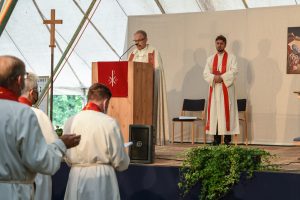
Bishop Risto Soramies preached a sermon in the consecratory service of the bishop, providing guidance for the future for the task of the bishop elect.
The outgoing bishop counselled the bishop elect on how he does not have to invent anything original as the Gospel of Jesus Christ will always suffice, furthermore it will always be timely. The mission of the Bishop is to feed the flock with the Word of God and to make sure that no strange doctrines get in and tear it apart.
“Draw in from the abundance of grace for yourself and for your diocese. Grace increases when it is used. The Word of the forgiveness of sins will never grow old,” Bishop Soramies reminded the bishop elect.
At the onset of the consecration, the Rev. Dr. Samuli Siikavirta, the diocesan notary, read the bishop’s credentials, after which Bishop Risto Soramies asked the attending congregation: “Do you wish to receive Juhana Pohjola as your bishop and take him into your prayers.” The tent was filled with a strong and unwavering answer: “We do.”
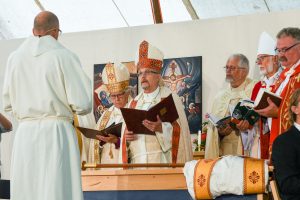
Bishop Risto Soramies asked the bishop elect the required questions about commitment and preparedness. The assisting bishops and pastors all read portions from the Bible.
The bishop elect was asked about his commitment to the faith of the Church and his readiness to suffer for the salvation of the flock if need be.
As the choir sang a hymn from the Pentecost Season, Juhana Pohjola received the symbols of the episcopal office. Bishop Soramies placed his pectoral on him, Bishop Thor Henrik With and Bishop Bengt Ådahl from the sister dioceses of Norway and Sweden assisted in clothing him in his robe, President Matthew Harrison of the Missouri Synod handed the crosier to him, and after the prayer of consecration Bishop Hanss Jensons of the Latvian Lutheran Church set the mitre on the new Bishop’s head.
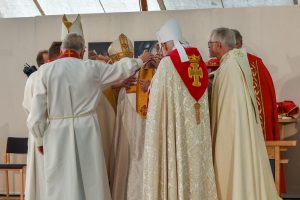
The laying on of hands. The Bishops emeriti of the Mission Diosece together with its pastors as well as the representatives of the sister churches bless Juhana Pohjola upon his episcopate.
The two pastors from the Mission Diocese to participate in the laying on of hands were the Rev. Mika Tervakangas, the youngest and the Rev. Sakari Korpinen the oldest pastor in the service of the Diocese.
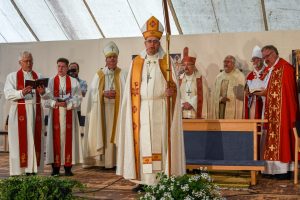
Bishop Pohjola and those attending the consecratory service at the altar spontaneously joined in a traditional hymn “Now we thank the good Lord and praise Him with joy”.
With the Bible verse of Jesus “Care for my sheep” Bishop emeritus Soramies sent the freshly elected Bishop upon his mission. As the newly consecrated Bishop turned to face his congregation, the tent was filled with the resounding, joyous continuation of the hymn “Now we thank the good Lord…”
The first duty of the new Bishop was to serve the congregation with the gift of Holy Communion. The door of heaven was open to all to come and partake of Christ and receive the forgiveness of sins.
The divine service ended with a touching moment when Bishop Risto who had been shepherding the Mission Diocese for the past eight years laid down his crosier, kneeling in prayer. While he still continues to serve congregations, the responsibility of care for the Diocese remained at the Lord’s altar. Bishop Juhana Pohjola then took his place at the rear of the Recession of the Cross.
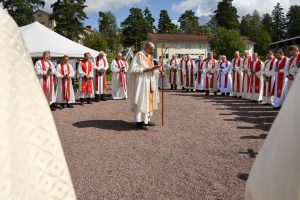
Bishop Juhana Pohjola leading his diocesan colleagues and the representatives of the sister churches in a prayer of thanksgiving at the end of the mass.
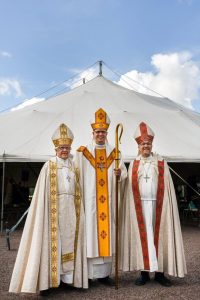
The three bishops, two of Bishop Juhana’s predecessors, in the continuum of the episcopacy: Bishop Risto Soramies left, Bishop Juhana Pohjola centre and Bishop Matti Väisänen right.
The consecratory service of the new bishop can be viewed from the YouTube-channel of the Diocese or directly from the link beneath.
Photos: Kari Puustinen
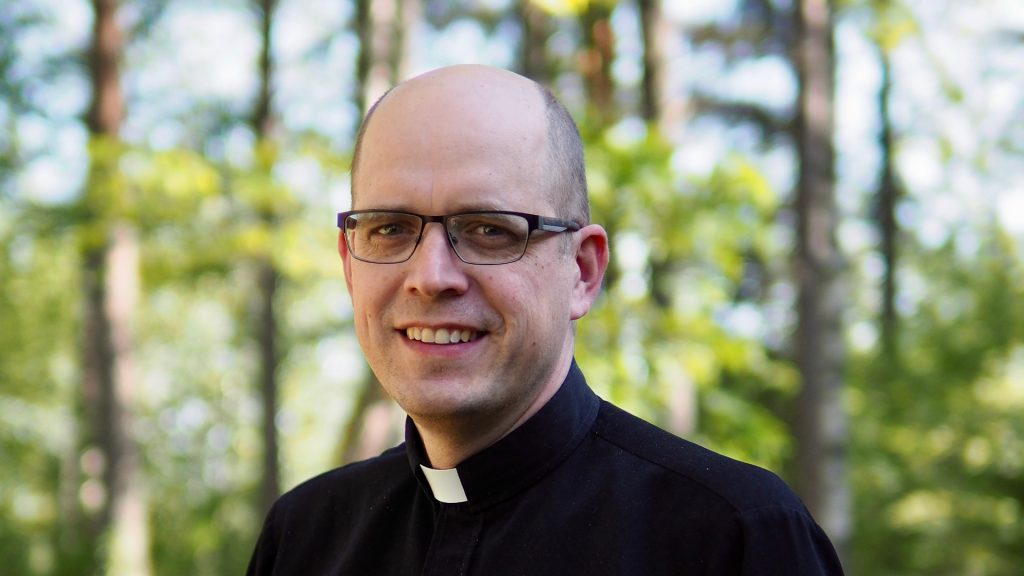
Diocesan Dean Juhana Pohjola
God willing, the Reverend Juhana Pohjola, ThD, will be installed into the Episcopal office on Sunday 1 August 2021. The installation is to take place in southwestern Finland (Loimaa) during the summer festivities of the Evangelical Lutheran Mission Diocese of Finland.
Upon entering into office Rev. Juhana will be the first full-time Bishop of the Mission Diocese. Bishop Risto Soramies, who preceeded Rev. Juhana, tended to the office during his retirement years, as did Bishop Emeritus Matti Väisänen prior to him. The responsibility of the Bishop of the Mission Diocese is to uphold the proper preaching of the Word and the administration of the Sacraments in the congregations. Further, he is to bolster spiritual unity, be the shepherd of the pastors as well as direct the overall work of the Diocese.
We invite you to remember Rev. Juhana and his family in your prayers as he prepares himself for this new calling.
We wish to offer you the possibility to send a congratulatory message to Pastor Juhana upon his installation. By filling in the following fields, you can send a personal message to the bishop elect. All the messages will be collected and delivered after the installation.
The bishop will be presented with the bishop’s crosier, vestments and pectoral cross. The installation ceremony will naturally incur extra costs. You may, if you so desire, participate in covering these expenses. Nonetheless, the largest change is the fact that beginning on 1 September the Mission Diocese will have a salaried bishop. You too can have the possibility to support the Mission Diocese and its bishop with regular donations.
Below, you will find banking information. Underneath that are fields for sending your congratulatory messages.

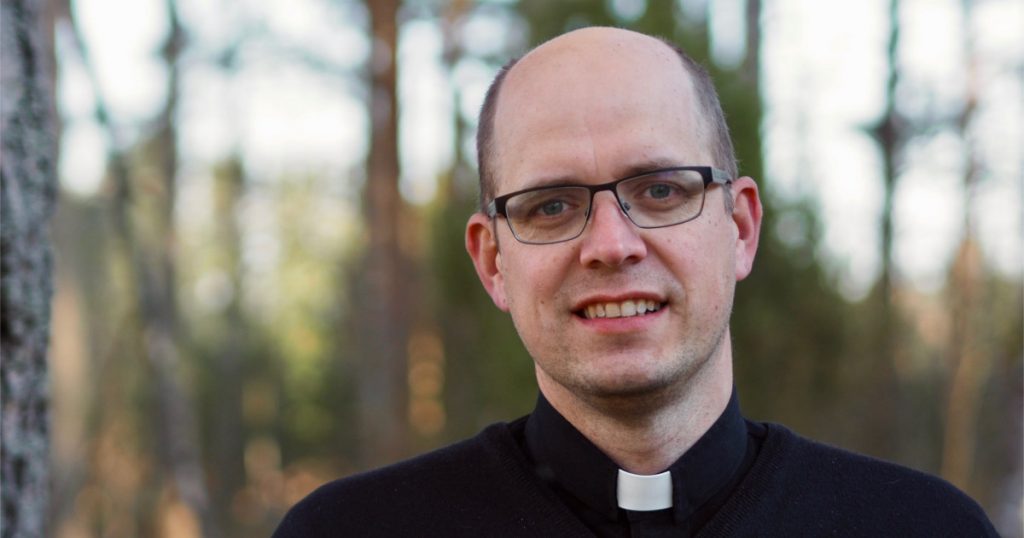
Dean Juhana Pohjola
The Prosecutor General [of Finland] has brought charges against the Rev. Dr. Juhana Pohjola, Dean of the Evangelical Lutheran Mission Diocese of Finland and MP Päivi Räsänen, MD. The case concerns Päivi Räsänen’s pamphlet Male and Female He Made Them — Homosexual relationships challenge the Christian concept of humanity, published by the Finnish Luther Foundation in 2004. The indictment is for incitement to hatred against a group.
As a representative of the Luther Foundation and editor-in-chief of its website, Dr. Pohjola, Bishop Elect of the Mission Diocese, has been responsible for the distribution of this pamphlet. According to the Prosecutor General, Dr. Räsänen’s writing is degrading and discriminatory against homosexuals. Diocesan Dean Pohjola denies having committed the offense of incitement.
“As a Christian, I neither want to nor can I discriminate against or degrade anyone created by God. Every human being is created by God and redeemed by Christ, and is thus equally precious. This is precisely the main theme of Dr. Räsänen’s writing. This does not negate the fact that, in accordance with the Bible and the Christian concept of humanity, homosexual relations are against the will of God, and that marriage is intended to be only between a man and a woman. This is what the Christian church has always taught and will always teach.
“The decision of the Prosecutor General reveals a great deal about our day and age. It is, after all,
historic that on account of the distribution of basic Christian teaching, we are summoned to district
court. While I am concerned about the state of religious freedom in our country, I trust that the
judiciary will reach the right decision.”
Today [29 April 2021] the Prosecutor General filed a document instituting proceedings in Helsinki District Court, which will set a date for the hearing.
Links:
Prosecutor General’s Press Release (Finnish, Swedish)
Male and Female He Created Them: text from the website of the Mission Diocese
 The Diocesan Assembly of the Evangelical Lutheran Mission Diocese of Finland (ELMDF, Mission Diocese) has on 23 January 2021 elected Diocesan Dean Juhana Pohjola as the next Bishop of the Mission Diocese. The ordained and two lay delegates from each congregation gave Pohjola 111 votes (90.2 %) through advance voting, whilst the other candidate Esko Murto received 12 votes. 95 % of the delegates voted in the election.
The Diocesan Assembly of the Evangelical Lutheran Mission Diocese of Finland (ELMDF, Mission Diocese) has on 23 January 2021 elected Diocesan Dean Juhana Pohjola as the next Bishop of the Mission Diocese. The ordained and two lay delegates from each congregation gave Pohjola 111 votes (90.2 %) through advance voting, whilst the other candidate Esko Murto received 12 votes. 95 % of the delegates voted in the election.
– I wish to express my gratitude for the great confidence you have shown in me by giving me such strong support and by electing me for this important and demanding task. I feel great weakness faced with such a great task and calling but I know that the matter has been discussed in the congregations and that many prayers and intercessions have been said for the matter, which encourages me to look forward from this, newly elected Pohjola commented in his thank you speech.
Dean Pohjola thanked his predecessors for the example they had set. He especially remembered Bishop Matti Väisänen’s legendary phrase at his consecration service concerning the episcopal pectoral cross.
– It is carried not on one’s stomach but on one’s heart. God willing, I also wish to be such a Bishop who will carry Christ’s sign of the cross on my heart and who will preach the Word of Life that alone makes us alive and that alone builds up the Church. For ultimately, we all are and our Church is upon the heart of our heavenly Father. In this regard, we have a massive, great common task in our dear fatherland and also on the mission field.
Bishop Risto Soramies’ characterisation of himself as ‘the world’s most wretched prayer’ spurred Pohjola to ponder on the meaning of intercession.
– The Apostle Paul, in nearly every one of his letters, asks the Church over and over again to pray for him and his coworkers. I think that if I am to be consecrated as Bishop of the Mission Diocese in August, I will be a Bishop who will need the most intercessions in the world.
Rev Dr Pohjola will succeed Risto Soramies (as Bishop from 2013 to 2021) as the second Bishop of the Mission Diocese. Matti Väisänen served as the first Finnish Bishop of the Mission Province of Sweden and Finland from 2010 until the foundation of the independent Evangelical Lutheran Mission Diocese of Finland in 2013.
– The pastoral college and the delegates of congregations elected Rev Dr Juhana Pohjola as Bishop of the our Church body. The ELMDF had the good fortune and the blessing of being able to choose from two learned and proven pastors. The pastoral gifts and tested courage of Dean Pohjola will certainly serve our congregations well. It is a blessing and a reason to be thankful to God for the retiring bishop to see a good man succeeding him in the office. May God grant Dean Pohjola all the grace and stamina that he will need as the shepherd of the shepherds and of the congregations, Bishop Soramies commented.
Juhana Pohjola (born 1972) currently serves as Diocesan Dean of the Mission Diocese (2013 to present) and as Dean of its supporting trust, The Luther Foundation Finland (2000 to 2011, 2012 to present). Previously, he has served as Head Pastor of St Mark’s Lutheran Church, Helsinki (2000 to 2010) and been a Visiting Scholar at Concordia Lutheran Theological Seminary, St Catharines, Canada (2011 to 2012). He holds the degrees of MTh (University of Helsinki, 1997), STM (Concordia Theological Seminary, Fort Wayne, IN, USA, 1998) and ThD (University of Helsinki, 2014). In his doctoral dissertation, he studied the view the Office of the Ministry and ordination in Finnish ordination rites. He is married, father of four children, and enjoys playing tennis and reading.
Dean Pohjola was ordained in the Diocese of Oulu (The Evangelical Lutheran Church of Finland, ELCF) in 1999 to serve the newly founded Luther Foundation Finland (LFF) in building independent confessional Lutheran communities within the ELCF. After breaking fellowship with the ELCF Bishop of Helsinki for doctrinal differences in 2004, the LFF was shunned by the ELCF. This led to a great deal of unexpected publicity and a rapid growth in the work of the LFF under Pohjola’s leadership. Pohjola was defrocked by the ELCF in 2014 for serving the Mission Diocese that was seen as a separate church body. In 2020, Dean Pohjola was interrogated by the police for a booklet written by MP Päivi Räsänen and published by the LFF in 2004 on the biblical view on creation and sexuality, citing the ethnic agitation law of 2011. The ongoing case concerns the freedom of religion and expression and has attracted worldwide attention.
Dean Pohjola’s Consecration into the Episcopal Office is currently planned to take place at the Mission Diocese Summer Festival in Loimaa, Finland, on 1 August 2021.
Churches are exhorted to join us in the following prayer:
Almighty and merciful God, Father of our Lord Jesus Christ, You have given Your Church the Holy and Apostolic Office through which You shepherd us by Your Word and Sacraments, protect us from error and and keep us steadfast on the way of eternal life. We thank You that You have through Your Holy Spirit led Your Church to elect Juhana Pohjola as our future Bishop. We pray You: equip him for this noble Office of Overseer with faithfulness and wisdom for the benefit of Your Church. Keep us united in in the truth and love of the Gospel; through Jesus Christ, our Lord and heavenly High Priest, who lives and reigns with You and the Holy Spirit, one God now and forever. Amen.
The Evangelical Lutheran Mission Diocese of Finland is a confessional Lutheran church with ca. 40 congregations and 2,200 members in Finland. The ELMDF is a member of the International Lutheran Council (ILC) and is in full fellowship with the Mission Province in Sweden, The Evangelical Lutheran Diocese of Norway, The Evangelical Lutheran Church of England, The Independent Evangelical Lutheran Church (Germany), Lutheran Church—Canada and The Lutheran Church—Missouri Synod (USA). The vision of the Mission Diocese is to continue to live out that biblical, Lutheran faith and ecclesiastical life which, in many places and in many ways, have been broken.
Press Release 16 November 2020
The Mission Diocese Declares Church Fellowship with the Missouri Synod
The Evangelical Lutheran Mission Diocese of Finland held its annual Diocesan Assembly at the Koinonia Centre in Helsinki on 14 November 2020. The Diocesan Assembly is the supreme decision-making body in the Mission Diocese. Due to the Covid-19 pandemic, representatives from 38 congregations and their head pastors participated in the meeting online.
In addition to statutory matters, the declaration of church fellowship with The Lutheran Church – Missouri Synod (LCMS) was on the agenda. The Missouri Synod is a confessional Lutheran church body in the United States of America with ca. two million members.
The Diocesan Assembly unanimously accepted the recognition of full communion with the LCMS.
In his letter addressed to the Diocesan Assembly, Missouri Synod President Matthew Harrison wrote that he rejoiced in being authorised to declare the recognition of altar and pulpit fellowship with the Mission Diocese.
– Your hospitality, service to Christ, and commitment to Scripture and to the Lutheran Confessions in the face of opposition, remain an example and encouragement to me and to our entire church. It is with special joy and thanksgiving that I write on behalf of The Lutheran Church—Missouri Synod humbly to extend our hand of fellowship to the Evangelical Lutheran Mission Diocese of Finland.
– We look forward to a strong relationship based upon our common confession of the truth as it is in Christ Jesus, wrote President Harrison in his letter.
Risto Soramies, Bishop of the Mission Diocese, who led the discussions of church fellowship with the LCMS, told the Assembly that full communion does not mean the renunciation of our independence or spiritual tradition but altar and pulpit fellowship on the basis of a common faith.
– Now our congregants may receive Holy Communion with each other and our pastors may preach at one another’s Divine Services. Our co-operation will certainly deepen in theological education and in the mission field – the Missouri Synod is, after all, a strong global operator. It is encouraging for us to see how the Mission Diocese is being recognised as a church body and how our work is being appreciated, Bishop Soramies sheds light on the significance of the decision.
Further information:
Secretariate of the Mission Diocese
Diocesan Secretary Mr. Sami Niemi
[email protected]
tel. +358 (0)50 5225 855
Program of the funeral service and reception is located here
In loving memory of Dr Anssi Simojoki
Please join us for a memorial service celebrating the life of Dr Anssi Simojoki on Friday 31st July at 1 pm (UTC+3) at the new church in Uusikaupunki, Finland. The funeral will be streamed live on the Mission Diocese Youtube-channel https://www.youtube.com/Lähetyshiippakunta-lhpk or directly at https://youtu.be/U2ZgyMwrRf0
Instead of flowers, we ask that our father would be commemorated by supporting the reprint of Martin Luther’s On Christian Freedom in Swahili through Lutheran Heritage Foundation. Anssi was part of the original translation team and when he visited Kenya last October and found out the book was out of print, he strongly suggested that it would be reprinted. The book will be distributed all over East Africa.
You can support the reprint with the following information:
Receiver: Suomen luterilainen lähetystuki
Account: FI57 5410 0220 3884 28
Reference: 3340
You can also donate online www.sllt.fi/lahjoita. The support will be wired in full amount to Lutheran Heritage Foundation who will oversee the printing, distribution and introduction of the book.
For USA (if you whish to donate straight to LHF)
Go to https://www.lhfmissions.org/support/donate-now/
Set Gift amount
Set destination to Kenya
Select “This gift is in honor, memory, or support of someone” and set to “In memory of”
Type “Anssi Simojoki”
Give payment details and click “Donate”
Guide
”I shall not die, but I shall live, and recount the deeds of the Lord.” Ps 118:17
You are all sincerely welcome!
Marja Simojoki
Martti and Hanna-Kaisa Simojoki
Tapani and Sarah Simojoki
Anna and Jussi-Pekka Rauha
Helena and Paul Simons
Tuomo and Leena Simojoki
Lassi and Suvi-Tuuli Simojoki
Yksityiskohtainen ohjelma pdf-tiedostona: Anssi Simojoen siunaustilaisuus ja muistojuhla
Detailed program in english as a pdf-file: Anssi Simojoki Funeral service and reception
Alkumusiikkia – Processional music
Ylösveisuu – Luterilaisia Virsiä 894 – Processional hymn – Up, up, my soul, and sing
Alkuvirsi – Vanha Suomalainen Virsikirja 410 – Hymn – In heavn’ above
Johdanto – Introduction
Rippi – Confession and Absolution
Rippisaarna – Confessional address
Yksinlaulu – Song
Epistola (1 Kor. 15:50–58) – Epistle (1 Cor. 15:50–58)
Psalmi (Ps. 118:15-25) – Psalm (Ps. 118:15-25)
Evankeliumi (Joh. 11:20–26) – Gospel (John 11:20–26)
Saarna – Sermon
Ruumissaarna – Funeral Sermon
Uskontunnustus – Apostle’s creed
Omaiset laskevat kukkalaitteen – The family place a bouquet by the casket
Ruumiinsiunaus – Committal
Rukous – Prayers
Isä meidän -rukous – The Lord’s Prayer
Herran siunaus – Benediction
Loppuvirsi – Virsikirja 320 – Hymn–Te Deum
Loppumusiikkia – Recessional music
Virsi – Virsikirja 270 – Hymn – I will sing my Maker’s praises
Puhe – Speech
Musiikkiesitys – Musical performance
Puhe – Speech
Lauluesitys – Song performance
Puhe – Speech
Virsi – Luterilaisia Virsiä 897 – Hymn – With my own eyes in time I shall
Puhe – Speech
Loppuvirsi – Achrenius 155 – Hymn – God’s goodness so amazing
Muistotilaisuus päättyy – End of the reception.
Suora lähetys päättyy – Live Stream ends
Siirtyminen uudenkaupungin hautausmaalle – The funeral procession proceeds to the Uusikaupunki cemetery for the burial.

Rev Dr Juhana Pohjola, Dean of the Evangelical Lutheran Mission Diocese of Finland, was summoned to be interrogated at the Helsinki Police Department on 11 February 2020, suspected of ‘ethnic agitation.’[1]
The police interrogation lasted for five hours. The interrogation focused on the facts surrounding the publication and distribution of the booklet written by Päivi Räsänen, Member of the Finnish Parliament and former Minister of the Interior, entitled Male and female He created them – Homosexual relationships challenge the Christian concept of humanity. Furthermore, the interrogation carefully went over those sections of the booklet that the Finnish Prosecutor General had taken to be defamatory and insulting to homosexuals.
“At the tactful and thorough interrogation, I said that I am, as the editor-in-chief, responsible for the publication and distribution of the booklet. I denied, however, being guilty of the crime of ethnic agitation. In my view, Mrs Räsänen’s text is not defamatory or insulting to homosexuals. In my answers, I showed that the booklet teaches in line with Christian anthropology that every person is precious as [being created in] the image of God, regardless of sexual orientation. This does not mean, however, that people are not responsible before God for their way of life or moral choices. The homosexual lifestyle is contrary to God’s order of creation and a transgression against His will. If one is not allowed to teach this publicly, the message of sin and grace will be left without a foundation, and freedom of religion will decline,” Pohjola says.
The preliminary investigation will now go on and the interrogation protocol will be passed on to the Prosecutor. Dean Pohjola will still have the opportunity to give a final statement before the Prosecutor decides whether to prosecute and bring the charge to the District Court, or not to prosecute.
This matter has been in Mission Diocese news earlier:
Dean of Diocese to Preliminary Investigation by Police
Booklet: Male and female He created them – Homosexual relationships challenge the Christian concept of humanity (The booklet may be read in English via this link – as well as the news item of the announcement of this investigation by the Prosecutor General of Finland. It is also available in Swedish here.)
In English in other media:
Finnish Lutherans under investigation for upholding biblical teachings on sexuality (International Lutheran Council, 05/12/2019)
Finnish police investigate Lutheran cleric for publishing book calling homosexuality a ‘disorder’ (LifeSiteNews, 05/02/2020)
Criminalizing Christian Teachings about Sex (blog by Gene Veith, Patheos, 11/02/2020)
Leader of evangelical Lutheran churches investigated for distribution of booklet on homosexuality (Evangelical Focus, 12/02/2020)
Christians Face LGBT Persecution in Finland (Fulcrum7, 13/02/2020)
Lutheran Leader Interrogated by Finnish Police Over Role in Distribution of ‘Male and Female He Created Them’ Booklet (Christian News, 13/02/2020)
ILC concerned over investigation of Finnish Lutherans, urges prayer (International Lutheran Council, 14/02/2020)
Finnish Evangelical pastor, MP under investigation over anti-LGBTQ booklet (Jerusalem Post, 19/02/2020)
[1] The Criminal Code of Finland (1889/39 and 2011/511), Chapter 11, Section 10 defines ethnic agitation as follows: “A person who makes available to the public or otherwise spreads among the public or keeps available for the public information, an expression of opinion or another message where a certain group is threatened, defamed or insulted on the basis of its race, skin colour, birth status, national or ethnic origin, religion or belief, sexual orientation or disability or a comparable basis, shall be sentenced for ethnic agitation to a fine or to imprisonment for at most two years.” (finlex.fi, translation from Wikipedia)

Diocesan Dean Juhana Pohjola
The Rev. Dr. Juhana Pohjola (ThD), Dean of the Evangelical Lutheran Mission Diocese of Finland, has been summoned to the Helsinki Police Department for a preliminary investigation on 11 Feb. 2020. Pohjola is suspected of being guilty of incitement to hatred against a group.
The matter at hand is the preliminary investigation ordered on 31 Oct. 2019 by Ms Raija Toiviainen, Prosecutor General of Finland, regarding the publication of the Suomen Luther-säätiö [The Luther Foundation Finland] booklet entitled “Mieheksi ja naiseksi hän heidät loi – homosuhteet haastavat kristillisen ihmiskäsityksen [Male and Female He Created Them – Homosexual relationships challenge the Christian concept of humanity]”, written by Dr. Päivi Räsänen, Member of Parliament [MD], published 2004.
Dean Pohjola is the editor-in-chief of the Luther Foundation Finland’s publications and the webmaster of its site. In such capacity he is under suspicion for distributing this material to the public and for keeping this material available online.
This matter has been in Mission Diocese news earlier:
Booklet: Male and female He created them – Homosexual relationships challenge the Christian concept of humanity – Päivi Räsänen (The booklet may be read in English via this link – as well as the news item of the announcement of this investigation by the Prosecutor General of Finland. It is also available in Swedish here.)
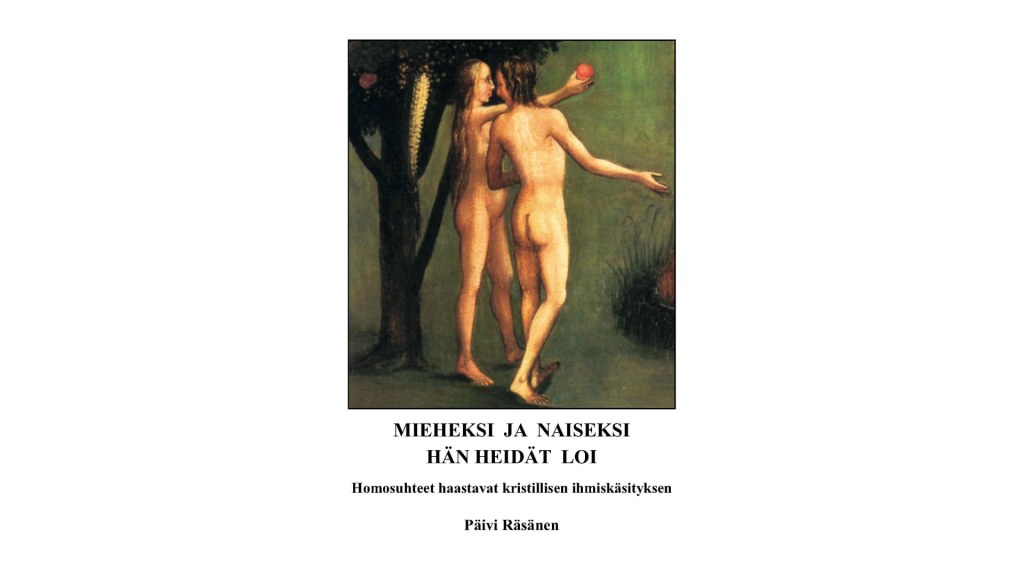
The Luther Foundation Finland (Suomen Luther-säätiö), the legal entity behind the Evangelical Lutheran Mission Diocese of Finland, is being investigated for incitement against a protected group. On 4 November 2019, the Finnish Prosecutor General Ms Raija Toiviainen announced that the Helsinki police will start a preliminary investigation about the publication and distribution of the booklet Mieheksi ja naiseksi hän heidät loi (in English, “Male and Female He Created Them: Homosexual relationships challenge the Christian concept of humanity”), published by the Luther Foundation in 2004 and still distributed online.
The author of the pamphlet, Member of Parliament and former Minister of the Interior Mrs Päivi Räsänen, is also being investigated for incitement, a crime punishable by a fine or up to two years of imprisonment. Dr. (MD) Räsänen is well known in the country for promoting Christian ethical stances on marriage and the beginning and the end of life, for instance. The pamphlet in question addresses the issue of sexuality and marriage in its biblical and societal context.
According to the Prosecutor General, the reason to start a preliminary investigation despite an earlier decision by the Helsinki Police that concluded otherwise is that, “there is reason to believe that because of the defamation of homosexuals by the violation of their human dignity, Ms Räsänen is guilty of incitement to hatred against a group.”
In other media:
Christian News
CBN
The Evangelical Focus
The American Conservative
The booklet has now been translated into English and may be downloaded here:
Male and female He created them -PDF download
The text can be be read here:
Homosexual relationships challenge the Christian concept of humanity
Dr. (MD), MP Päivi Räsänen
“My God is not a God of judgment.” “My Christian values mean love and tolerance, not judgment of people living in homosexual relationships.” “My God did not say that love had any conditions set on it.” “My Bible does not judge homosexuals.” The recent discussion on the Registered Partnership Act sparked confessions of faith such as these in Parliament as well as on the pages of the newspapers.
People today are thoroughly individualistic. They retain for themselves the right to set the boundary between right and wrong. They also wish to define for themselves what God is like. The Word of God must yield when people’s inner light speaks. If the Bible in some parts does not fit within the frames of their thinking, it is time such portions were cut out.
[Professor of Biblical Languages, University of Helsinki, first female University vice-Rector in Finland] Raija Sollamo became the key figure in the Yhteysliike [now: Ecumenical Solidarity Movement], an intra-Church advocacy group for homosexual relationships. In a seminar organised in Parliament by Seta [LGBTI Rights in Finland, Gender Diversity & Intersex Centre of Expertise], she admitted that the Bible does not contain any portions where the homosexual lifestyle might be approved of. In fact, Biblical ethics is irresistibly clear on this particular issue. Homosexual relationships are clearly considered against the sexuality that was created by God, not only in the Old Testament but even more powerfully in the New Testament. In the Solidarity Movement, these Biblical guidelines are regarded as void in this day and age.
Is, then, the essence of the Christian faith not love without any conditions? It certainly is. Yet God’s infinite love is not in conflict with the order of life created by Him. Quite the opposite! We do need mercy for the very reason that we have broken, transgressed, against the will of God.
Over the years, I, too, might have torn out many portions from my Bible if I had been authorised to build my own image or picture of God that suited my own sense of justice. I have noticed that this only reveals how limited and warped my understanding is. People who submit themselves to God’s guidance in the Bible are repeatedly amazed at how the very Bible teachings hardest to understand contain God’s deep wisdoms.
Self-made “gods” are nice things to have around until people actually start to need God. Then self-made gods are no help in the hour of need. The Bible became a precious treasure to me the day I became frightened of my own sinfulness and realised I was spiralling down to damnation on the basis of my own belief. I understood that if God existed He would reveal Himself and His will in the manner He had chosen. If I could not rely on the Bible as the Word of the Living God, I could not be certain of the atonement of my sins and my salvation. How could I believe the most wonderful Biblical message of Jesus’ atoning death and His historic resurrection if I thought the Bible is full of messages totally inappropriate to our day and age? And in general, where would I need a crucified and resurrected Lord if God is not a God of judgment, Who in His holiness does not accept sin?
“My god” has become the idol of today. How different is God, Whom Jesus taught us to pray to. “Our Father in heaven!” It is not a coincidence that we pray to Him in the we-format. God is for the entire congregation—our God. He is not the god of my imagination, the god of my superior sense of justice and of my wishes, but He is the living, Holy, Almighty God, Who is in heaven.
We live at a phase in history in which the influence of Christian culture upon society is diminishing. As society becomes pluralistic, we are ever more frequently caught up in situations where seemingly similar goals actually mean the opposite of each other. That which is termed equality by some is considered sin by others. What is considered love by some, seems intolerance to others.
This tendency challenges Christians to think over what they base their ethical positions on and how they justify them. What standing does the Bible, God’s special revelation, have when societal statements are formed or when the boundaries between right and wrong are sought?
All ethical choices are founded upon some values and worldviews. No choice of policies is ethically neutral. On many issues regarding humanity and the family, we are at a juncture where we must choose either Christian core values or a trend which rejects them.
The further society disengages from Christian ethics, the greater becomes the necessity to examine the inferences of natural moral law by the special revelation, i.e. in the light of the Word of God. As a result of the Fall into sin, humanity has become morally corrupt, and therefore has a propensity to twist the natural moral law to fit its own selfish interests.
In December 1997, the Ministry of Justice (Finland) set a working group to clarify “the legislative measures necessary to revoke the injustices directed towards the cohabitation of same-sex partners.” The Report was delivered in May 1999. It proposed that same-sex couples should be given the possibility to register their partnerships. On the basis of this Report, the Government wrote a draft Act in December 2000. The Act on Registered Partnerships was approved in Parliament on 9 September 2001. There were 99 votes for the Act, 84 against. When the first homosexual couples registered their partnerships at Register Offices, the television cameras and press were in attendance and the nation could follow the events. The new legislation brought registered homosexual couples, where applicable, the same rights and duties as married couples.
In actuality, the acceptance of homosexual partnerships meant a more profound change in values than was willingly acknowledged at the time. When the registered same-sex relationships were equated with marriage, a development was started which was difficult to halt. During the processing of this Act, it was affirmed to the Church, and to Christians concerned about the consequences, that the Church could retain its own values and views on homosexuality. Shortly after the Act was passed, a warning was issued to the Church about discriminating against its employees who intended to form homosexual partnerships. This was based on their fundamental rights against discrimination.
Several Members of Parliament approved homosexual partnerships on the condition that the new form of the family would not involve children. Nonetheless, the Government stipulated via a joint motion that legislation concerning the adoption rights of homosexual couples be prepared. The Government undertook the preparation of a proposal for fertilisation treatments for lesbian couples. The possibility of registering relationships was an interim objective for those advocating for homosexual rights.
A change in the foundations of the family is not a socially insignificant issue. The change does not only affect a few couples, but profoundly affects society as a whole. In fact, it is difficult to come up with a social undertaking that strikes as much at the heart of the foundations of society as does the same-sex partnership. Therefore, the legislative reform aroused exceptionally strong feelings both for and against.
Marriage is the oldest contract in human history. It remains the most important legal contract in society. By its very essence and by the order of creation, marriage is a union between an adult man and an adult woman. Heterosexual marriage comprises the richness and the core of sexuality—the tension arising from the difference between a man and a woman, and the theoretical possibility of having children together. These are lacking in homosexual relationships and other sexual anomalies.
Due to its unique purposes, marriage is to have a special status in society. Unfortunately, the Bishops’ Conference did not issue its own statement. The statement issued by the national Church Board on the proposed Act stated: “The Church Board holds that when marriage is given a preferential position it supports a balanced life and the overall interests of society. Marriage between a man and a woman is the basic model and the major channel for sexual relationships, and on that basis the continuity of society is possible. The family unit based on marriage is the basic institution upholding the human race, the support of which is necessary and beneficial for the common good.” The philosophical premise of the [Government’s] proposed Act was quite different. It was seen as a disadvantage that “same-sex couples are completely excluded from the ordinances on marriage and spouses.”
The Church Board statement emphasised that legislation regulating the status of joint households should not be developed on the basis of a particular sexual anomaly. If there were a desire to clarify problems such as the dissolution of cohabitation, this legislation should also apply to joint households comprising siblings or friends. In these cases, cohabitation would not be based on sexual relationships.
Marriage and family law is never value neutral. It is strongly linked to the social values on which we desire to base society. For example, we do not accept polygamy, the marriage of close relatives, child marriages—all because of our values.
The family (mother and father) is the most important unit in our society, and marriage is per se the most secure model for family life. The well-being of families determines the well-being of society. Family happiness is also accompanied by the responsible sexuality of adults. In the last few decades, Western society has undergone a major breakdown in sexual ethics. For its part, sexual freedom has contributed to a decline in the commitment to couples relationships. Children in particular have become the victims of this.
The legislation regarding marriage is not meant to place a seal of affection on marriage and give a guarantee of love, but it is for the protection of the continuity of society. Marriage is a family support network whose primary purpose is to provide children with a stable mental home and lasting human relationships. In practice, it is true that family crises have already weakened the marital institution as the foundation of our society. However, the well-being of families is not improved by further weakening the status of marriage.
Changing the concept of the family to include same-sex couples also means breaking away from the Christian roots of the concept of the family in the marriage, a foundation that is read aloud in the wedding ceremony: “For this reason a man will leave his father and mother and be united to his wife, and the two will become one flesh.” On this basis, it is impossible to reconcile the relationship between two men or two women.
Other Nordic countries have for many years experienced the impact of registered same-sex partnerships on society. When speaking about homosexual relationships, the terminology previously belonging only to marriage has been introduced, the examples of which are weddings, wedding ceremonies or marriage partners. The change in the concept of the family is reflected in family education in schools, which teaches that one can marry a person of different or the same sex at the age of majority. Homosexual couples have been blessed in churches. In Denmark and Sweden, work is underway to expand the legislation and guidance on homosexual couples’ adoption rights, infertility treatments and church weddings.
I consider it entirely possible that homosexuality can increase when it is legislatively favoured by equating it with heterosexual marriage. It is strange to claim that the surrounding culture has no impact on the prevalence of homosexuality. For example, in classical Greek-Roman culture, pederasty, or man-boy love, as well as homosexuality were common phenomena. The homosexuality of men was widely accepted, and it also occurred widely. Of course, homosexuality is present even in cultures that are anti-homosexual. Nonetheless, it is unfounded to claim that its prevalence is a constant, independent of the surrounding culture.
The equation of same-sex partnerships to marriage brings about new challenges in the rearing of children. Both via family education in schools and through the media, children are presented a message of diversified sexuality. Homosexuality and lesbianism are normalised. When they watch homosexual weddings on TV, even small children understand that in adulthood it is possible to marry people of the opposite or the same sex.
The above may increase confusion especially among preteens whose sexual identity is often still uncertain but whose sexual experimentation does start early. In 1991, a study of over 34,000 students indicated that 25.9% of 12-year-olds were uncertain about their sexual identity. Only 5% of 18-year-olds were unsure. At the latter age only one out of 100 described himself/herself as being homosexual or bisexual. The overwhelming majority of those previously uncertain in their sexual identity developed into heterosexuals. According to the study, the earlier a young person has homosexual experiences, the harder it is to get rid of this inclination.
The level of sex education for preteens and young people is exceptionally weak at the moment. Both the information in media and at school lack the values of marriage, fidelity and commitment. The concept of sexual responsibility is limited to remembering to use condoms. One guidebook intended for school children summarises the message: “One does not have to be in love to have sex. Sex can be enjoyed without any particular commitments. A hot romance may be ignited, climaxed and cooled down in half an hour.” (Kumisutra [a play on the words “kumi / rubber” and “kamasutra”]) The collapse of sexual values has created pressure on young people to engage in early sexual experimentation by which they measure their own normality.
It is an especially dangerous combination when the present-day valueless, superficial sex education, which encourages sexual experimentation, is connected with an overall acceptance of homosexual relationships. If this shallow sexual value basis is coupled with the message that society finds it equally desirable to have people in due time marry either the opposite sex or the same sex, this clearly encourages early homosexual experimentation as well. This in turn opens up the venue for sexual abuse in which adult men find it easier to have sexual contacts with underage boys.
Frequently, the groups advocating for homosexual “rights” ask: What does it matter that there is this change in values in society? Even if homosexual relationships might threaten marriages, what bad could come from it? What difference does it make if people act out their homosexuality?
Ultimately, the issue is one of whether homosexuality is a neutral state of being or a negative developmental disorder from the person’s own viewpoint. If the latter option is the case, advocating for homosexual “rights” further harms these. In addition, advocating for homosexual “rights” promotes such a rupture in the values of society that does not at all support human growth towards balanced marital relationships.
Justification for registered homosexual partnerships was made by arguing that homosexuality might be an inborn and unchanging quality. A Finnish MP, a spokesperson advocating for homosexual relationships, even presented the concept that all of us have within us the two sides of sexual orientation, one of which is more or less predominant.
Medical studies have obtained no proof for the claims that homosexuality is genetic, hereditary or inborn. Without any exception, talks of the discovery of homosexual genes have proved false. On the other hand, it is true that people seldom consciously decide to become homosexual. A sexually anomalous emotional life is infrequently a deliberate state, chosen or caused by the people themselves. Underlying factors may be found in disorders of psycho-social development in early childhood or puberty. To mention one example, among children who have been sexually abused, the risk of developing homosexuality is higher than among the general population.
The inclination to homosexuality as such is not a characteristic comparable to mental health issues or physical ailments. Instead, the scientific material unequivocally proves that homosexuality is a disorder of psycho-sexual development. Those who claim that homosexuality is a natural “healthy” variety of sexuality nullify the evidentiary value found in family background studies for political reasons. Due to pressure from homosexual activists, political objectives have overridden scientific facts.
A change in sexual orientation is also possible. A considerable number of lesbians have previously lived in heterosexual relationships. Ms Paula Kuosmanen, a lesbian activist, in her article “Lesboäidit ja lapset=lesboperhe? [Lesbian mothers and children=lesbian family?]” states: “In Finland the most typical form of lesbian family is a blended family where the biological mother of the children had her children in a traditional heterosexual relationship and only later formed a blended family with another lesbian.” If inclinations can change from heterosexuality to homosexuality, why could it not change in the opposite direction as well? The reintegration of the sexual identity toward a normative heterosexual emotional life is possible when people themselves are motivated and willing to be treated.
Seta, a Finnish organisation with an agenda for the equality of sexual minorities, does not represent all those who feel they are homosexual. Some of them personally find that Seta ideology is very strange. Many homosexuals have found support and encouragement in sexual identity reintegration through pastoral counselling and therapy.
Don’t homosexuals have the right to love? Don’t we trust their ability to love? Most assuredly, homosexuals are as capable of loving as are heterosexuals. Love for our fellow human beings should belong to all of our relationships, both among the opposite and the same sexes. Men can love men and women can love women.
In a homosexual relationship or in a marriage, the issue at stake is not just about the love for our neighbour but also about a sexual relationship. In a healthy human life, sex is not a part of just any human relationship. Love is not to be equated to falling in love. The concept of erotic love means that people sexualise what is foreign to their own identity, “other than me”. Early on, the development of homosexuals often exhibits a strangeness to their own sex, whereupon they seek to find the mystery of the gender that seems strange to them in another person of the same sex.
Since homosexual couples nonetheless exist, should legislation not adapt itself to new phenomena? In public discussions some advocates of homosexual relationships appealed to the fact that Parliament could not stipulate what types of families were formed in everyday life. While they claimed that homosexual relationships were simply each individual’s private business, they also wanted these relationships to be given legal support.
I am also of the opinion that legislation is not to be overly involved in people’s private lives. An important function of legislation is, however, to steer societal life in such a direction that is considered right and good. Despite the early onset of sexual relationships and living-together arrangements among young people, no conclusion has been reached that marriage ought to be allowed for minors. Even in this day of multiple relationships, polygamy is not considered appropriate.
Marriage and the registered partnerships comparable to it are public institutions affecting all of society. The legislation on registered partnerships was desired for the very reason that homosexual relationships would not remain mere private matters but through public and legal agreement would also receive societal acceptance. In an article published in Helsingin Sanomat [the leading newspaper in Finland], Ulf Månsson, a homosexual activist, summarised this thought: “Registering partnerships signifies a great deal more than economic commitment. Above all, it means societal acceptance and attitudinal formation.” The objective of the Act on Registered Partnerships is to affect societal attitudes so that homosexual orientation would be acknowledged, in its fulfilment of sexuality, as equal to heterosexuality. In this manner, there is an attempt to remove the environmentally caused attitudes of guilt as well as the guilt linked to homosexual relationships themselves.
Seta, the organisation advocating for the equality of sexual minorities, represents, apart from homosexuals, a large spectrum of other sexual anomalies, such as bisexuals. It is to be noted that homosexual culture is a part of the spectrum of sexual anomalies and is in itself multifaceted.
In the practice of homosexuality, two main lines of behaviour can be discerned: casual sex within the homosexual community and permanent partnerships. Casual sex and living-together arrangements were legalised with the change of the Criminal Code in 1971, then with the registration of partnerships in 2002. The most common patterns in the homosexual community are casual sex and changing partnerships. It can be claimed that this is a consequence of the discrimination against homosexuals long prevalent in Western culture. I personally see that this also proves something about the brokenness of homosexuals. This brokenness cannot necessarily be seen by the persons themselves, or they do not wish to acknowledge it. This brokenness does apply to all people. For instance, when satisfying their immediate needs, people involved in extramarital affairs or those who are workaholics do not often acknowledge the fact that they are doing harm to themselves and others, at least under the values prevailing in our time.
For heterosexuals, casual sex and living-together arrangements reflect a fear of commitment and responsibility. The registration of homosexual relationships has been pursued with the thought of the stability of partnerships: It would be better to encourage homosexuals to commit themselves to relationships. A good goal has been pursued for the wrong matter. Commitment is an important thing in human life, but practising homosexuality, even in a stable registered partnership, is also harmful to the person involved, to the partner, and perhaps to people close to them.
The registration of homosexual partnerships is a question of values, not a question of human rights. From a human rights perspective, every human being is treated as a citizen with equal rights, irrespective of sexual orientation. A human rights perspective does not presuppose same-sex marriages. Our fundamental rights quite correctly prohibit discrimination against people based, inter alia, on sexual inclination, but this does not require the elevation of anomalous relationships to the status of marriage. Our Constitution also prohibits discrimination on the basis of religious convictions, but it does not require the marriage law to be changed to allow for polygamy, even if, for example, the Islamic minority insists on it, appealing to their human rights or their private standards of sexual ethics.
According to the Christian concept of humanity, everyone, regardless of sexual orientation, is equal and of equal value. However, equality between people does not mean equality in sexual behaviour. Different ways of carrying out sexuality are by no means morally equivalent.
When homosexual couples relationships are equated to marriage, this inevitably alters the concept of the family from the viewpoint of parenthood. Proposals are being prepared on the rights of same-sex couples to adopt children or receive infertility treatment. A mother and a father as a child’s parents would be replaced by two lesbian mothers or two homosexual fathers. For lesbian couples or for single women, infertility is not a disease, but a natural condition. To allow medical assistance for infertility in these situations is not justified. We should not artificially create scenarios where a child ends up missing a father. Unfortunately, the number of children suffering from the absence of a father is already overly common in our society.
Every human being born on this planet, other than one blessed exception, is born of a biological father and mother (Jesus was born; Adam and Eve were created). There is no known situation in the history of humankind where two women or two men were capable of reproduction. Thus, nature does not accidentally produce a child with two mothers or two fathers. Gender-neutral parenting is no substitute for the motherhood and fatherhood that is in accord with the order of creation.
Having children is not ultimately a human right for a woman or a man, but children should have the right to both parents, a mother and a father, in their daily lives. The sole significance of the father must not be reduced to simply acting as a sperm donor. This is a strange signal at a time when fathers are otherwise being encouraged to take responsibility for their offspring. If fathers do not add any value to the care and rearing of children, on what grounds then are they to be called to account for their families? Studies show that fathers who are present improve their daughters’ academic success and prevent depression, as well as increase their sons’ socialisation and prevent aggression.
Throughout history, legislation has been aimed at protecting children’s rights to fathers whenever possible. Recently, it has even been considered whether, in principle, children could be judicially completely fatherless, so that they each might have two mothers; and biological fathers who would simply remain in the role of sperm donors.
However, lived life demonstrates that fatherlessness is a tragedy even in our time. Perhaps the most heart-rendering story about this came from a woman over 80 years of age who still continues to fight to be recognised as the daughter of a man who died over 50 years ago. In her case, this is not about an inheritance or money. But the greatest wish of her life would be to be allowed to call this man, dead for half a century, her father.
Within the Church, a clash has occurred between societal law and Biblical principles. Which one should it obey: the Constitution of the Republic or the Bible, the supreme guideline of Church doctrine? Even before the approval of the Act on Registered Partnerships, it became evident that after the Act came into force, there would be pressure focused upon the Evangelical Lutheran Church of Finland for the approval of homosexual relationships. Many MPs who sided with the acceptance of the Act on Registered Partnerships gave their assurance that the Church would continue to have the right to adhere to the Biblical teaching on the family, even in relation to homosexuality. However, the struggle within the Church was already underway. The small, but very aggressively campaigning Yhteysliike [now: Ecumenical Solidarity Movement] demanded that Church employees should gain approval for their homosexual relationships. A proposal for an agenda for blessing for homosexual couples was submitted to the General Synod of the Church. Immediately after the Act was approved, some bishops instructed Church pastors to refrain from blessing homosexual partnerships and the homes of same-sex couples.
Article 18 of the Finnish Constitution requires that no one shall be dismissed from work without legal justification. If the Church wants to restrict fundamental rights, the restrictions must be recorded in the Church Act. For this reason, for example, the Church Act contains a statute requiring Church staff and officeholders to be members of the Church. Otherwise, the dismissal of a verger who converted to Islam or an office worker who had left the membership of the Church would be unconstitutional. It could be interpreted that the Church had violated the religious freedom of its own employees, granted to them by their fundamental rights.
Given the constitutional protection of the right to a family, how could the Church require its own employees to refrain from homosexual partnerships, a form of marriage as defined by law? In consideration of the event of possible litigation, the Church should impose a restriction on same-sex partnerships in the Church Act. However, it is difficult for the Church to remain true to its own values in a society that has placed values alien to itself as normative. The leadership of the Church faces a difficult choice. As recently as autumn 2003, the General Synod of the Church had left this issue unresolved, awaiting the passage of time.
The leadership of the Church has deliberated over whether there are sufficient or clear grounds in the Bible to take a stand on homosexuality. It has been said that if we knew what Jesus would say about homosexuality, we would follow it “in a hurry”.
There are passages in both the Old and New Testaments that deal with the practice of homosexuality. In each passage it is clearly against the will of God. In Genesis 19:1-11 the men of Sodom wanted to have sex with the men who came into Lot’s home, men who were angels. The situation was threatening and violent, and all parties involved know that this was an evil deed (the men of the city said to Lot in verse 9, “We’ll treat you worse than them”).
The Mosaic Law explicitly prohibits the practice of homosexuality (Leviticus 18:22): “Do not lie with a man as with a woman; for it is an abomination.” The sentence was severe (Leviticus 20:13): “If a man has sexual relations with a man as one does with a woman, both of them have done what is detestable. They are to be put to death…”
In none of His speeches did Jesus nullify the Old Testament Law, not in regard to the practice of homosexuality either. In questions regarding sexuality, for example in the encounter between Jesus and the woman who was caught committing adultery (John 8), He did not nullify the Law concerning adultery (“Go now and leave your life of sin”). Jesus did not nullify the punishment—because He Himself suffered the punishment of the woman on the cross (“Neither do I condemn you…”). Thus, Jesus offers salvation to each of us because we have all transgressed against the will of God (“Let any one of you who is without sin…”). Jesus did not abolish the Law, but He fulfilled the Law (Matthew 5:17,18). He was sinless, and He died for our sins.
The entire Bible is ultimately the Words of Christ. His teachings are not only the Gospels, but also, for example, the Letter of the Apostle Paul to the Church of Rome. The Apostle Paul considers homosexuality to be contrary to God’s order of creation (Romans 1:24-32):
“Therefore God gave them over in the sinful desires of their hearts to sexual impurity for the degrading of their bodies with one another. They exchanged the truth about God for a lie, and worshiped and served created things rather than the Creator—who is forever praised. Amen.
“Because of this, God gave them over to shameful lusts. Even their women exchanged natural sexual relations for unnatural ones. In the same way the men also abandoned natural relations with women and were inflamed with lust for one another. Men committed shameful acts with other men, and received in themselves the due penalty for their error.
“Furthermore, just as they did not think it worthwhile to retain the knowledge of God, so God gave them over to a depraved mind, so that they do what ought not to be done. They have become filled with every kind of wickedness, evil, greed and depravity. They are full of envy, murder, strife, deceit and malice. They are gossips, slanderers, God-haters, insolent, arrogant and boastful; they invent ways of doing evil; they disobey their parents; they have no understanding, no fidelity, no love, no mercy. Although they know God’s righteous decree that those who do such things deserve death, they not only continue to do these very things but also approve of those who practice them.”
The Apostle Paul regards the occurrence of homosexuality and its overall acceptance as a consequence of people having abandoned reverence for God. Homosexuality was a prominent and widely accepted phenomenon in Rome where Paul wrote his letter. Finally, the apostle was astonished at those who knew God’s righteous decree, and nonetheless continued committing acts against the order of creation and the will of God, or “also approve of those who practice them.”
The Apostle Paul indicates that the general revelation is already sufficient to prove the fallen state of humanity before God. According to Paul, homosexual relationships are a clear example of behaviour which is contrary to the order of creation. If our understanding of the general sense of justice was not distorted by sin, we would by nature be able to perceive homosexuality as unnatural, even if we had not even heard about the Bible. In the light of the special revelation, i.e. the Word of God, there should be nothing unclear regarding homosexuality. Paul refers to “God’s righteous decree”, according to which “those who do such things deserve death.”
In another passage, Paul writes again (1 Corinthians 6:9,10): “Or do you not know that wrongdoers will not inherit the kingdom of God? Do not be deceived: Neither the sexually immoral nor idolaters nor adulterers nor men who have sex with men nor thieves nor the greedy nor drunkards nor slanderers nor swindlers will inherit the kingdom of God.”
In their interpretations of the Bible, some bishops have appealed to the understanding that a great deal more is known of homosexuality today than was at the time the Bible was written. This is true: We do know that it is a disorder of psycho-sexual development. On the one hand, underlying alcoholism there has been found genetic susceptibility, harmful environmental factors and behavioural patterns; on the other hand, the inclination to criminality has a connection to attention deficit disorders. Should criminality be allowed if a person has a compelling inclination towards it? Then, if homosexuality is a developmental disorder, people are not to be encouraged to practise it.
At times we hear it claimed that the Bible would only forbid homosexual relationships wherein one male partner is subjected to and abused by the other. This is done in an attempt to prove that there was no other kind of homosexuality in the Bible or that the Bible accepted all relationships which were based on love and mutual respect.
No grounds can, however, be found in the Bible texts themselves. For instance, the above-mentioned Romans 1:26-27 states: “Because of this, God gave them over to shameful lusts. Even their women exchanged natural sexual relations for unnatural ones. In the same way the men also abandoned natural relations with women and were inflamed with lust for one another. Men committed shameful acts with other men, and received in themselves the due penalty for their error.”
This text speaks about both men and women who in an equal manner (“lust for one another”) were inflamed with lust for same-sex persons and carry out their lust. It is important to note that women are actually discussed in the above Bible extract as well.
During Antiquity, apart from the submissive sexual relationships between men, there were also same-sex non-submissive relationships involving men or women. The Letter to the Romans considered these an expression of ungodliness against the order of creation. In ancient Greece, love between men existed, both spiritual and physical. For example, according to Plato, the only true love was love between men. Love between a man and a woman did not rise to this level, because a woman was somewhere between a man and an animal in her mental capacities. Therefore, according to Plato, love between a man and a woman was only carnal, meant to satisfy a man’s needs and for procreation. The spectrum of homosexual love seems to have been as vast as in the Western culture of today. Why would the Apostle Paul have only meant submissive homosexual relationships when he does not mention anything which refers to submission?
At times, homosexuality is justified on the basis of Mother Nature, for example, as either natural or unnatural. The advocates of free sex typically take as their model the nature of the human animal, and perhaps also that of species mating with several spouses. The justification for accepting homosexuality is that it also occurs in the animal kingdom.
According to the Bible, we are the image of God on the basis of creation. We have a special position in creation. We are responsible for our actions before God, and unlike animals, we can control our desires. Thus, we must not be driven by our animal desires. On the other hand, we live in a world created by God and everything God created is good. He also created sexual pleasure as a rich fabric in the life of a man and a woman. In a responsible marital relationship between a woman and a man, within the framework intended by God, sex is natural.
The reality of the Fall means that God’s creation work is corrupted in many ways. We no longer live in a perfect and sinless Paradise. The sexuality created by God is also distorted. On the basis of the occurrence of homosexuality in humanity, we cannot draw the conclusion that homosexuality as such was created by God.
In the controversial Ecce Homo photo exhibition, Jesus was portrayed with homosexuals in modern events. The message of the exhibition was that the love of God also applies to people living as homosexuals. True, God loves all sinners. But this does not negate God’s desire to save people from sin.
The approval of homosexual partnerships is often insisted upon by making an appeal to the love for one’s neighbour. Thus, Biblical guidelines are considered significant only to the extent that following them would fulfil the principle of neighbourly love. However, this neighbourly love also includes giving a warning to people about actions harmful to themselves. Loving neighbours warn their friends against walking out on thin ice just in the same manner as cautioning against homosexual acts.
Paul equates the commission of sin and the approval of sin in strikingly similar terms of condemnation (Romans 1:32). The Church is in great peril where it is tempted to demonstrate its approval of homosexual relationships. Blessing same-sex relationships or allowing its employees to practise homosexuality would already be a clear signal that the Church accepts these relationships. At the same time, the Church would lose its ability to extend the message of the Law and the Gospel to homosexuals. God loves homosexuals so much that He also wants to draw them through the Word of the Law to Christ and to be partakers of the Gospel.
The early church did not adapt to the social values of its time. The mission of the Church is to tell Finns how the Word of God regards the practice of homosexuality. The Church is guilty of discrimination against homosexuals if they are not allowed to hear the full truth of the Word of God, which includes both the Law and the Gospel. The Church’s mission is also to show by its example that God must be obeyed more than human beings. The Church is not guilty of discrimination if it dares to use the word sin, both in regard to homosexual and extramarital sexual relationships.
In congregations there needs to be more room and love for people who are hurt by homosexual emotional lives or other sexual anomalies. The message of grace belongs to all sinners and all broken people. There is no one in the world whose masculinity or femininity would be perfect and intact.
In Sweden, an Act came into force at the beginning of 2003 concerning the right to teach the portions of Scripture dealing with homosexuality. Those who disseminate statements alleging homosexuality to be a sin can be sentenced up to two years in prison for incitement against a group of people. If the offence were considered minor or if suspects agreed to withdraw their statements, they might get by with only fines or parole.
According to the interpretations of legal scholars, it would not yet be a crime to repeat the Bible texts as historical documents. Instead, the criminality is established if the pastors explain in their sermons that life today must also be lived according to the teachings of the Bible. The news concerning the neighbouring country must be taken seriously, because in many respects Finland seems to follow behind it—coming along sooner or later.
Are we going to see news of Swedish pastors being led from pulpits handcuffed to police interrogations? Shall we hear messages from congregations who are praying for their shepherds in prison? In fact, the worst thing will be if nothing changes in Sweden after the Act comes into force. What if the legislature is pleased to find that the Act has proved to be an unnecessary defence measure taken in emergency? After all, pastors have nothing to fear if even up to this point they have not taught that homosexual relationships are against the will of God.
Is such an Act ultimately the result of the Church’s voluntary abandonment of the Bible in many respects? If the credibility of the Word of God is denied at one point, that fundamentally means we focus doubt on God Himself. Therefore, it is impossible to sweep under the rug issues regarded as “adiaphora” to salvation simply in order that the peaceful coexistence of parishioners would not be disturbed. If the Church does not adhere to clear passages from the Word of God on ethical issues, the core of the Gospel will eventually be threatened too.
The devil’s ultimate goal is to block the sinner’s way to Christ. The means to do this are as old as human history: “Did God really say… ?” By this question Eve was deceived—with horrendous consequences. Even then, the issue seemed rather adiaphoristic, after all, it was only about one tree from among the others.
In a message I received from Sweden, the writer wonders why Christians are silent. Why does no one call other people to prayer or fasting? What would we say today about the prophet Isaiah, who, at the command of God, walked about for three years barefoot and naked as a sign of how the exiles would be transported shamelessly with buttocks bared? We would still need a prophetic voice today. Personally, I hope the distress does not grow so great that the style and manner of Isaiah will be needed. But shepherds should dare to tackle the very themes that ask, “Did God really say… ?” May the messages of the Swedes act as an invitation to prayer—for ourselves and for the Swedes.
A few months ago I received an email from a person wondering if I still considered the Biblical teaching on the family relevant. This person asked: “If the Bible so most unequivocally relates the facts, can you look me straight in the eye and claim that you believe the story of how the sea parted at the stroke of a magic wand, how Jesus fed an immense crowd of people with a few fish and a couple pieces of bread, etc.? If you in all seriousness believe these stories, how can you imagine that anyone would take you seriously? On the other hand, if you do not believe them but rather consider them symbolic examples of divine power, etc., then why does the Bible serve as a reference book on issues such as homosexuality?”
I replied to the enquirer that in my opinion the central claim of Christianity, Jesus’ resurrection from the dead, is the Bible’s most unfathomable miracle. From a medical doctor’s point of view, this is the utmost impossibility. The dead cannot come back to life. If God performs such a miracle, why can He not perform other miracles? Jesus’ death and resurrection is the core of the entire Christian faith. On this the Bible stands or falls. If one does not believe in it, there is nothing left of Christianity. And yet again, if I believe this, it follows logically that I must believe everything else Christ teaches in the Bible through the Apostles and Prophets.
This trust in the Word of God and the joy and assurance of the Gospel go hand in hand. Some of the worst “killjoys” of our time are the teachings that undermine trust in the Bible as the Word of God. If God is not the Holy God who condemns sin as described in the Bible—including homosexual behaviour—why did the Son of God have to die? If we deny people the right to feel guilt for their sin, we also deprive them of the joy and assurance of the Gospel. The certainty of heaven rests on Christ’s assured atonement for our very real sins and on His resurrection from the dead.
—————————————————————
The deterioration of marital morality is essentially related to the increase and spread of sexual anomalies. This received public understanding at a high ecclesiastical level in 1993. Shortly thereafter, in his book (SLEY-Kirjat), Asser Stenbäck, professor of psychiatry, published a timely reminder that sexual anomalies do not include the gift of creation, but are developmental disorders that can also be healed. “Life contrary to anatomy is unnatural.”
Päivi Räsänen has written this concise informational booklet on the issue. As a Member of Parliament, she explains the relevant social codes. As a physician, she sheds light on the phenomenon as a disorder of the human psyche and as something that obscures the status of the family. As a Christian, the author summaries the unequivocal teachings of the Bible, i.e. the will of God, on this issue.
Sexuality is God’s good and beautiful gift of creation. God has created us as man and woman. But when sexuality is torn away from the creative will of God, it becomes a destructive force. Sanctions against the practice of sexual anomalies have been removed from the Criminal Code. However, in the name of “tolerance”, the Church cannot accept as a behavioural model sexual anomaly, adultery, or fornication, even in the lives of its employees. Christ has suffered the punishment set by God for various sins in the Bible, and has removed them (John 8:1-11). With respect to this matter, the will of God continues to be in force. The love of God calls upon Christians to carry all their sins, including the sins of their sexual lives, in faith to Christ to be healed. Thus, by the Spirit of Christ, we put to death the misdeeds of the body (Romans 8:13). Rev. Eero Parvio
This booklet continues the Luther Foundation Finland’s series Aamutähti [Morning Star], which focuses on the basic issues of faith. The series is edited by Rev. Simo Kiviranta, ThLic, and Rev. Juhana Pohjola.
The Luther Foundation Finland
Morning Star
No. 29.
This booklet has been donated by:
LUTHERAN HERITAGE FOUNDATION
51484 Romeo Plank Road
Macomb, MI 48042
USA
lhfmissions.org
SUOMEN LUTHER-SÄÄTIÖ
[LUTHER FOUNDATION FINLAND] PL 127
00101 Helsinki
Finland
luthersaatio.com
Change log:
5.12.2019 11.25
Changed term “ethnic group” to “protected group” on the 1st paragraph of the news section of the article
Changed “Mrs.” to “Dr.” on the 2nd and 3rd paragraph of the news section of the article
5.12.2019 14.00
Changed term “pretrial” to preliminary in 1st and 4th paragraph of the news section of the article
Changed “Dr.” to Dr. (MD) on the 2nd paragraph “Dr.” to “Ms.” on the 3rd paragraph of the news section of the article
Changed the name of the booklet on the first paragraph to “Male and Female He Created Them: Homosexual relationships challenge the Christian concept of humanity”
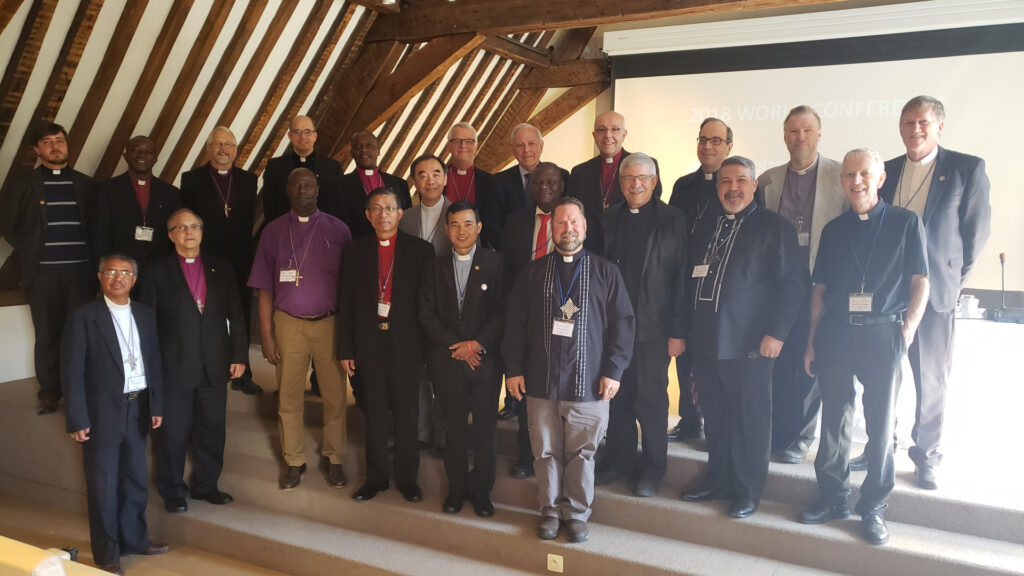
The ILC’s Executive Council pose with representatives of new member churches.
The Evangelical Lutheran Mission Diocese of Finland was accepted into membership of the International Lutheran Council (ILC) at its World Conference, 25-28 September 2018.
The ILC is a worldwide association of confessional Lutheran Churches. It is composed of members with an unconditional commitment to the Holy Scriptures as the Word of God and the Lutheran Confessions as its faithful exposition.
Bishop Risto Soramies rejoices over this: “Membership in the International Lutheran Council is a significant development for the Finnish Mission Diocese. We are taking our place among the confessional Lutheran Churches in the world.”
The ILC has 38 member Churches from around the world, with a combined membership of over four million. The ILC is experiencing a period of rapid growth. Altogether, the leaders of the the Churches gathered in Antwerp, Belgium, represented some 20 million Lutherans across the globe.
The ILC meets every third year in its World Conference. In addition to the Mission Diocese, eleven other Churches were received as full members and six as observer members. The largest of these bodies is the rapidly expanding Malagasy Lutheran Church of Madagascar, with four million members.
“It is very touching to see how the ILC is developing,” said the Rev. Juhana Pohjola, Dean of the Finnish Mission Diocese. “ Many former mission Churches do not want to follow the western Churches in watering down their theology. They are enthusiastic about building on a biblical and confessional basis.”
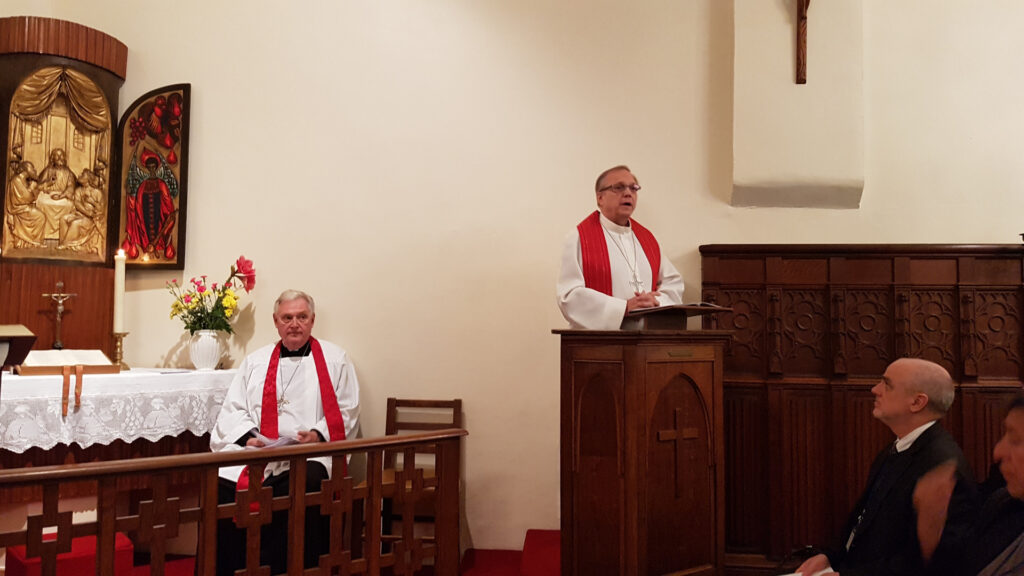
Bishop Risto Soramies preaching during Matins
The ILC exists for the purpose of building cooperation between Churches, jointly studying theological issues, taking stands on current phenomena, supporting theological education, and strengthening the shared global mission vision of the Gospel of Jesus Christ.
The International Lutheran Council celebrated its 25th Anniversary in Antwerp. In actuality its roots extend to 1952. The theme of the World Conference was Ecclesiology and Ecumenism.
For further information:
ELMDF Bishop Risto Soramies preached on the martyrs of the church during Matins.